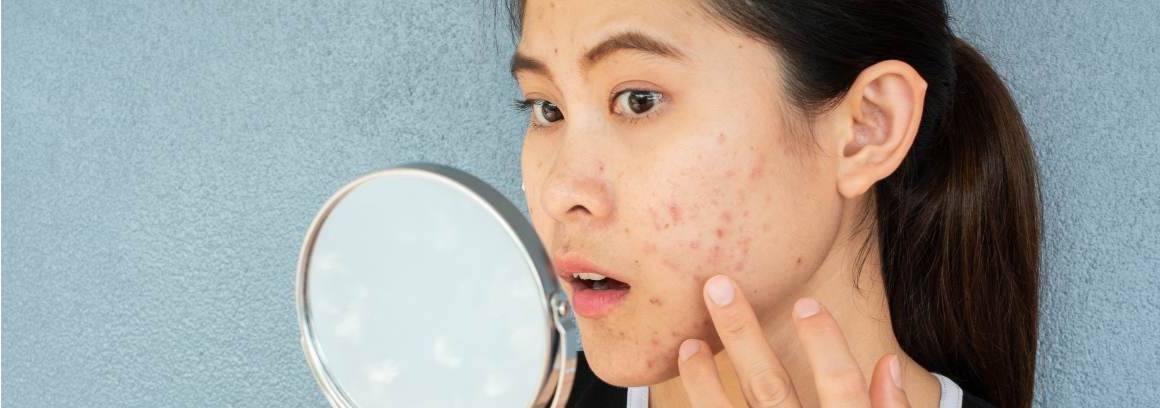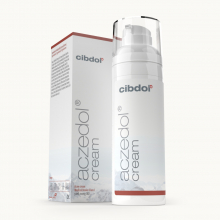Why do I wake up with a new pimple every day?
Published:
Waking up to discover a new pimple on your face can be frustrating and confusing. Where did it come from? Why does it keep happening?
Contents:
- What's Causing My Morning Pimples?
- Why Do Pimples Seem To Appear Overnight?
- Morning Pimple Prevention Tips
- When Should I See A Dermatologist?
- The Takeaway
- Frequently Asked Questions About Waking Up With Acne
- What's the connection between acne and sleep?
- How does sweating overnight cause pimples?
- Can using dirty makeup brushes cause morning acne?
- Why does my skin break out more on days I work out?
- How do I stop my hair products from causing acne?
- Can my laundry detergent or fabric softener lead to breakouts?
- Why does my skin get more oily overnight?
- How can I prevent mask-related breakouts?
- When should I see a dermatologist?

Pimples that seem to appear overnight or first thing in the morning are often the result of things going on underneath your skin's surface. By understanding the most common causes, you can start to get a handle on frequent breakouts.
What's Causing My Morning Pimples?
There are a few key culprits that could be contributing to your AM acne flare-ups:
Hormones
Hormonal fluctuations are a very common cause of breakouts. Changes in your hormones increase oil production and inflammation, making you more prone to clogged pores and pimples.
Some specific hormones that impact breakouts:
- Androgens - Male sex hormones like testosterone. Women have them too but in smaller amounts. Higher levels can lead to breakouts.
- Estrogen - Peaks around ovulation which can cause breakouts. Dropping estrogen levels before your period starts can also trigger pimples.
Sleep Habits
How you sleep can influence your skin's health. Not getting enough quality sleep or staying up late disrupts your natural circadian rhythms. This imbalance can show up on your skin.
Sleep habits that may cause AM breakouts:
- Inconsistent sleep schedule
- Sleeping face down on your pillow
- Not washing your face before bed
- Sleeping in makeup or sweat
Stress
High stress levels lead to elevated cortisol which causes excess oil production and inflammation. The night/morning is when cortisol levels peak, hence the pimples.
Oily Skin
Excess sebum (oil) production is a major player in pimple formation. Oily skin types tend to be most affected by AM acne as oil secreted throughout the night clogs pores.
Bacteria
Acne is caused when pores become clogged with oil, dead skin cells, and bacteria. The bacteria Propionibacterium acnes thrives overnight which is why pimples can suddenly pop up first thing.
Product Reaction
Sometimes morning pimples are a reaction to hair or skin products applied before bed. Try switching up your nighttime routine if you notice breakouts.
Why Do Pimples Seem To Appear Overnight?
Now that we've covered the common causes, you might be wondering why these pimples seem to sprout up out of nowhere. Here's some background on the overnight pimple cycle:
Breakouts form in four key stages:
1. Clogged Pore - Extra sebum, dead skin cells, and bacteria plug up a hair follicle.
2. Inflammation - Immune cells detect bacteria and cause the follicle wall to swell.
3. Redness & Swelling - Blood flow to the area increases. White blood cells fight infection causing swelling and redness.
4. Pustule - The blocked pore ruptures, releasing pus. A whitehead or blackhead forms.
This entire process can take days to occur deep under the skin's surface. You can't detect a pimple forming until the later inflammation/swelling stages.
That's why pimples seem to crop up suddenly overnight! The perfect storm was brewing under your skin the days prior.
Morning Pimple Prevention Tips
Now that you know why those overnight pimples occur, here are some tips to help prevent them:
Establish a consistent nighttime routine
Going to bed and waking up at the same times each day helps balance hormones for less oily skin. Aim for 7-9 hours of sleep per night.
Wash face morning and evening
Double cleansing at night removes dirt, oil, makeup, and bacteria so pores stay clean. Use a gentle cleanser in the morning to maintain fresh skin.
Change pillowcases frequently
Dead skin and oils collect on your pillowcase and transfer back to your skin clogging pores. Change them 2-3 times a week.
Avoid irritation before bed
Steer clear of harsh products at night that may cause irritation and inflammation leading to breakouts.
Reduce stress through exercise & meditation
Lowering stress helps normalize cortisol levels and balance hormones for clear skin.
Monitor diet
Some foods like dairy and high-glycemic carbs can trigger breakouts. Keep a food journal to identify possible offenders.
See a dermatologist
For hormonal acne, prescription medications like birth control pills or retinoids may be needed to regulate oil production.
When Should I See A Dermatologist?
Persistent overnight breakouts may signal the need for professional treatment. See a board-certified dermatologist if:
- Morning pimples continue despite adjusting your routine
- Breakouts are widespread over the cheeks, jawline and neck
- Acne is moderate to severe with painful cysts or nodules
- You have acne along with irregular periods or signs of hormonal imbalance
- Over-the-counter products do not improve acne after 2 months of daily use
A dermatologist has access to prescription-strength treatments that can get to the root causes of recurring AM pimples. Popular options include:
- Oral contraceptives - Birth control pills help balance hormones and decrease oil production.
- Spironolactone - A blood pressure medication that slows down oil production and reduces testosterone levels.
- Isotretinoin - The most powerful acne drug, isotretinoin treats acne by reducing oil secretion and inflammation.
- Topical retinoids - Vitamin A derivatives like tretinoin help unplug pores and prevent new blackheads/whiteheads.
The Takeaway
Waking up with an angry new zit can put a damper on your morning. But understanding common causes like hormones, sleep position, hygiene, bacteria, stress and skin type can help you prevent those pesky AM breakouts.
Pay close attention to your nighttime routine. Stick to a regular sleep schedule, wash your face well before bed, change pillowcases often, and avoid potential irritants. Managing stress and your diet can also improve overnight breakouts.
If your morning pimples persist despite lifestyle measures, promptly visit a dermatologist. Prescription acne treatments are the most effective way to combat ongoing hormonal and inflammatory acne. With professional help, you can finally say goodbye to morning pimple surprises and enjoy consistently clear skin!
Frequently Asked Questions About Waking Up With Acne
Wondering why you keep getting pimples overnight? You're not alone! Here are answers to some common questions about morning acne:
What's the connection between acne and sleep?
Your sleep habits definitely influence breakouts. Not getting enough sleep or having an inconsistent sleep schedule can disrupt your circadian rhythms. This leads to more oil production and inflammation. Sleeping face-down puts pressure on your skin and transfers dirt and oils from your pillow back onto your face, clogging pores.
How does sweating overnight cause pimples?
Excess sweat from tossing and turning mixes with oil and dead skin cells, creating the perfect breeding ground for pimple-causing bacteria. Changing into clean pajamas and washing your face after night sweats can help prevent breakouts. Using breathable cotton sheets and lightweight blankets also reduces sweating.
Can using dirty makeup brushes cause morning acne?
Yes! Not properly cleaning makeup brushes transfers dirt, oil, and bacteria back to your face when applying products. This buildup clogs pores, leading to more acne. Deep clean brushes with brush cleanser or a gentle shampoo at least once a week.
Why does my skin break out more on days I work out?
Sweat and oils produced during exercise get trapped under your skin if you don't shower immediately after. These clog pores and cause pimples overnight. Rinse off right after a workout and thoroughly wash your face to keep exercise from triggering breakouts.
How do I stop my hair products from causing acne?
Hair gels, mousses and leave-in conditioners contain pore-clogging ingredients. If your hair touches your face at night, these products transfer to your skin and cause morning breakouts. Put hair up before bed and wash your face/neck to remove any product residue.
Can my laundry detergent or fabric softener lead to breakouts?
Yes, they contain harsh chemicals that deposit on your pillowcases and sheets. These irritants get on your skin while you sleep, blocking pores. Use fragrance-free, sensitive skin formulated detergents. Skip the fabric softener which makes fabrics less breathable.
Why does my skin get more oily overnight?
Your body's sebum production follows a circadian rhythm and naturally ramps up overnight. Higher oil levels mixed with dead skin cell shedding increases your risk of clogged pores and morning acne. Using oil-control products before bed helps reduce overnight oily buildup.
How can I prevent mask-related breakouts?
Acne where your mask sits is often called "maskne." The heat, humidity and friction under your mask clogs pores. Be sure to wash your face after wearing a mask. Disposable masks and mask liners can also help prevent maskne pimples.
When should I see a dermatologist?
Make an appointment if you have severe, painful acne, if over-the-counter products haven't helped after 2 months, or if acne is impacting your self-esteem. A dermatologist can prescribe medications to treat the hormonal or inflammatory components of chronic breakouts.










